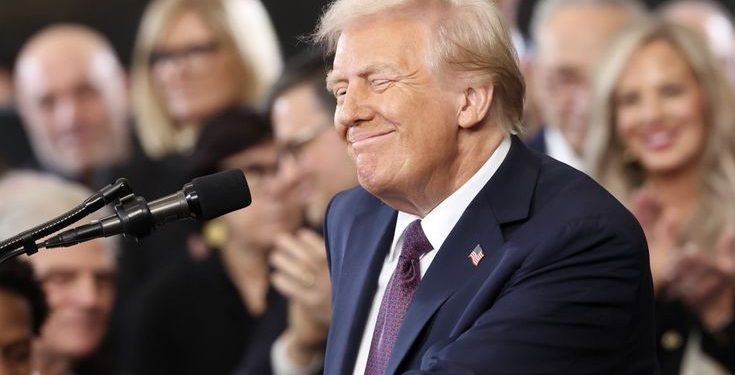Global financial markets experienced a significant downturn on Monday, April 7, 2025, following President Donald Trump’s announcement of sweeping tariffs aimed at addressing trade imbalances. The move has intensified fears of a global recession, leading to substantial losses across major stock indices.
In the United States, the Dow Jones Industrial Average dropped approximately 1,200 points (3.6%), the S&P 500 declined by 3.3%, and the Nasdaq Composite fell by 4%. These declines mark the worst trading day for U.S. markets since the early days of the COVID-19 pandemic. The tech-heavy Nasdaq, in particular, entered bear market territory, reflecting a significant shift in investor sentiment.
European and Asian markets mirrored this negative trend. The Stoxx Europe 600 index decreased by 6%, Germany’s DAX fell over 6%, and the UK’s FTSE 100 dropped nearly 5%. In Asia, Japan’s Nikkei declined nearly 8%, Hong Kong’s Hang Seng plummeted 13%, and Taiwan’s TAIEX experienced its largest single-day drop of 9.7%.
The commodities market also felt the impact, with West Texas Intermediate crude oil prices falling 4% to approximately $59 per barrel. This decline reflects concerns over decreased global demand amid escalating trade tensions.
President Trump defended the tariff measures, stating they are necessary to rectify longstanding trade imbalances. However, the administration has faced criticism both domestically and internationally. Economists from Goldman Sachs have increased the probability of a U.S. recession in the next year from 35% to 45%, citing tightening financial conditions and rising policy uncertainty.
In response to U.S. tariffs, China announced retaliatory duties, including a 34% tariff on American imports. Chinese officials have labeled the U.S. measures as economic bullying and have initiated complaints with the World Trade Organization.
The market volatility has prompted calls for diplomatic solutions to prevent further economic damage. Financial experts warn that continued escalation could lead to prolonged market instability and disrupt longstanding trade relationships.
In response to all these, president Trump told everyone in the U.S not to panic, calling the move necessary for the betterment of Americans in future
“The United States has a chance to do something that should have been done DECADES AGO. Don’t be Weak! Don’t be Stupid! Don’t be a PANICAN (A new party based on Weak and Stupid people!). Be Strong, Courageous, and Patient, and GREATNESS will be the result!”




















































